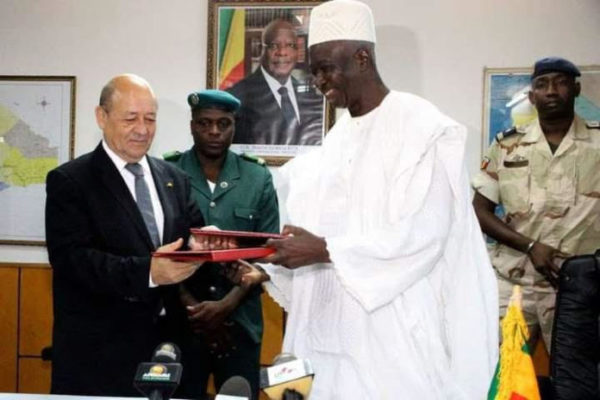Since joining the Government as Minister of Defense under François Hollande then Minister of Foreign Affairs under Emmanuel Macron, Jean-Yves Le Drian, the current boss of the Quai d’Orsay, by his deeds and his feats of arms on the continent, recalls De Gaulle’s “Monsieur Africa”, the famous Jacques Focart.
Mythical architect of French networks in Africa, Jacques Foccart was, from 1959 to 1974, advisor to General de Gaulles, liege man of Georges Pompidou, essential advisor to Valéry Giscard d’Estaing for African and Malagasy affairs . During all these decades, Foccart has built the foundations and laid the foundations for the duration of the framework for expressing relations with the new independent states, conceived as an extension of French policy: “They have a character of particular cooperation between France and its former colonies on the one hand and other African countries on the other hand in the most important sectors of their activities. In addition, they are based on a level of friendly and personal ties developed with the leaders “, explains this former member of the Africa cell of the Elysee.
The “Foccart method” is carried by the political generations who prepared and then orchestrated the decolonization of the French Empire from the 1940s to the 1980s. Out of its chronological framework, it has become an immutable recipe for Franco-African relations. The “philosophy of the Foccart method” is the conviction that there would have been a unified African policy, that of neocolonial “Françafrique”, with its procession of direct interventions, corruption of leaders and the troubled role of intermediaries, twisted blows of mercenaries and military interventions like the blows of mercenary Bob Denard, or factors typical of this network such as Robert Bourgi, Jean Yves Olivier …
Indeed, flashing back on the methods and influence of Jacques Foccart is an essential exercise in shedding light on some of the long hidden and very dark springs of the Fifth Republic and Franco-African relations. The networks set up by Foccart constitute the heart of what we can call the Foccart method, as it is at the very foundation of what we designate under the name of “Françafrique”, which he, with General de Gaulle, has contributed to founding and orienting French policy in Africa which has enabled Paris to maintain its influence and diplomacy, particularly within the United Nations where the Africa group aligns itself, most of the time, with its positions, in particular the countries French-speaking.
The secret of Jacques Foccart’s influence, and what increases the effectiveness of his network, is what we can call the multipositionality of Jacques Foccart, that is to say the fact that he occupies the Élysée, in the state apparatus and within the Gaullist movement, a number of strategic positions straddling the formal and the informal. Jacques Foccart’s network relies on multiple institutional positions whose resources it can mobilize to extend its influence within other institutions and other networks: this is what we will call Foccart’s “web”. This Foccart canvas if it has aged and has had some difficulty in recycling because the water has flowed enough under the bridge with the rise in power of the new generations in Africa which calls for a break, Jean Yves Le Drian leads to little almost philosophically the same methods somewhat with an orientation focused on business and the retraining of old men in the service and the military into new lobbyists or occult advisers in the fold of underground diplomacy.
The Le Drian the new Foccart method
Under Holland, Jean-Yves Le Drian often found himself at loggerheads with Laurent Fabuis, who held the post of Minister of Foreign Affairs. It was from Operation Serval and, later, from Barkhane, during the intervention of the French army in Mali, that Jean-Yves Le Drian began to weave his web. He succeeded in his time in convincing Hollande to prioritize the construction of regional security programs.
It was at this precise moment that the Defense Ministry took the lead over the Quai d’Orsay on African issues. This geopolitical and military geostrategic turn has fundamentally enabled Jean-Yves Le Drian to build throughout the five-year term by relying on his functions as Minister of Defense where he played informally the role of Minister of Africa. Moreover, the nostalgic leaders of Françafrique, opponents and rebels of Central Africans, Chadians and others passing through Paris, regularly made a technical stopover at Cédric Lewandowski, the director of Jean-Yves Le Drian’s cabinet.
Le Drian, like Jacques Foccart, manages his networks with complete discretion. “The Le Drian team was not prepared for Africa, but it very quickly knew how to rely on French military know-how to manage hostage cases and intervention in the Sahel”, explains a good source introduced into the French arcana in Africa. Having become Minister of Foreign Affairs, Jean-Yves Le Drian experiments his security multilateralism and the philosophy of the scabrous promotion of preferring “a Devil whom France masters than an unknown angel”, although carried by the aspirations and the will of the peoples of the continent . Thus the authorities in Africa and those nostalgic for Françafrique use the Le Drian channel to reach Macron.
The Malian crisis which seemed to surprise more than one did not, according to our sources, surprised Jean Yves Le Drian who was beginning to be exacerbated by the attitude of President IBK. He did not hesitate in a tweet to say without gloves: “In Mali, President IBK did not meet the aspirations of the people, there was a real crisis of confidence in this country, which resulted to this coup. ” Remained somewhat in the background on the Malian file, preferring to leave the hand to ECOWAS in order to lead the pressure on the junta, Jean-Yves Le Drian nevertheless kept his eyes wide open on Mali where Turkey, Russia and Algeria multiply diplomatic ballets.



